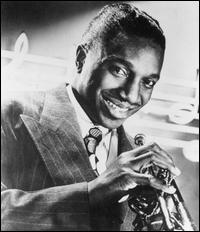Oran Thaddeus Pages (January 27, 1908 to November 5, 1954) was an American jazz trumpeter and singer. He was born in Dallas, Texas, United States. By the public, he was known better as Hot Lips page and by his fellow musicians as Lipspage. He was a fiery soloist and a powerful singer. Page was a member Walter Page’s Blue Devils and Artie Shaw’s Orchestra. He also worked with Ma Rainey and Bessie Smith. Page, who moved from Texas to Corsicana in his teens, traveled extensively across the United States, including as far as Atlanta and New York City. He was a performer in circuses, minstrel shows, and backed blues singers like Ma Rainey, BessieSmith, and Ida Cox. Page was influenced by Louis Armstrong’s trumpet playing, but he also cited other local musicians, such as Harry Smith (Kansas City), and Benno Kennedy, (San Antonio), throughout his career. He is believed to have been a teenager in the mid-1920s and appeared with Troy Floyd and His Orchestra, San Antonio, Texas. Also, with Eddie and Sugar Lou (a Tyler-based dance band), though no documentation has been found to support this. He claimed that he appeared in 1925 with Goog and His Jazzbabies in Shreveport, Louisiana, and with French’s Jazz Orchestra in New Orleans. However, no documentation has been found. Walter Page, the Oklahoma City Blue Devils’ bassist, noticed him in 1926. Although it is believed that Oran Pages joined the Blue Devils in 1927, there is no documentation to prove his presence until 1928. From the fall of 1927, he played and toured with Blue Devils, until he was recruited to the Bennie Moten Orchestra in Kansas City. Page was a vocalist, emcee, and hot trumpet soloist in the Count Basie’s Reno Club Orchestra after the Moten band disbanded due to the sudden death of its leader, April 1935. Page began a solo career, performing with small, local pick-up bands in Kansas City where he had lived since the spring of 1931. Page and Jimmy Rushing performed at the Reno Club in downtown Kansas City. Basie’s band was just beginning to establish their reputation. However, in 1936, on the eve Louis Armstrong’s national success, Page decided to pursue his solo career. In December 1936, he moved to New York City. Page’s career began well as a bandleader. He had sold-out performances and a long run at Harlem’s Small’s Paradise during the summer 1937. However, Page was struggling to keep a regular band. He was a successful and popular performer who led many bands and combinations of his own. Page toured extensively in the south of the United States and Canada, where he was a member of 13 big bands. In 1938, he briefly appeared with Bud Freeman’s Orchestra. He was also a featured singer and hot soloist in Artie Shaw’s Symphonic Swing Orchestra, where he recorded more than 40 sides. He recorded over 200 recordings from 1929 to 1942, most of them as a leader for Bluebird, Vocalion and Decca, Harmony Records among others. Although Page was not credited as the leader, his band supported Wynonie Hari on the session that produced “Good Rocking Tonight”. He led the Apollo Theater’s house band in the 1940s. In 1949, he recorded duets on “The Hucklebuck”, and “Baby It’s Cold Outside”. In 1949, he traveled to Europe and performed at Salle Pleyel’s first international jazz festival. He returned to Europe at most twice during the 1950s for extended tours. Page was affectionately known as “Mr.After Hours” by his friends because of his ability to fight off all comers in jam sessions late at night. In 1941, Page was recorded at Harlem’s Minton’s Playhouse playing a type of proto-bebop style that was then in vogue. He was a versatile trumpeter, with a wide tone and an extensive range of notes. His mysterious death has left historians largely unaware of his legacy, but he is widely considered to be one the greatest Swing Era figures and the originator of rhythm and blues. EPILOG: Jet magazine says that Oran Page died from a heart attack on November 5th, 1954. Page, 46 years old, died in New York on November 5, 1954.
